#rue du parlement
Explore tagged Tumblr posts
Text
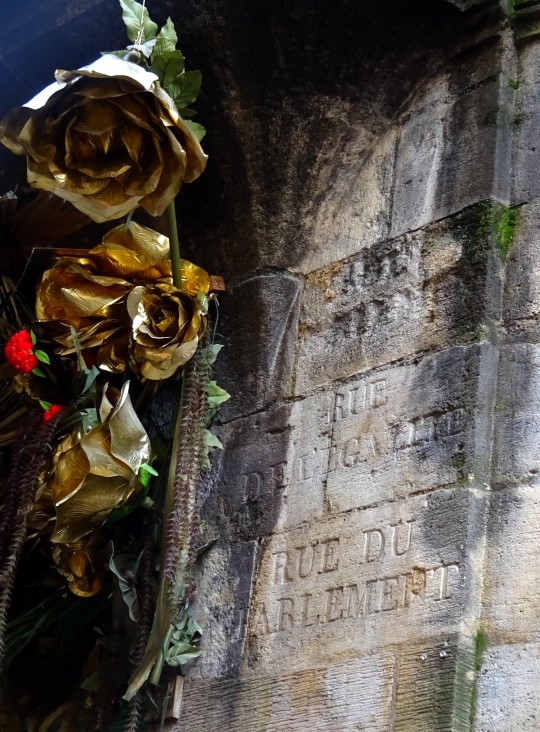

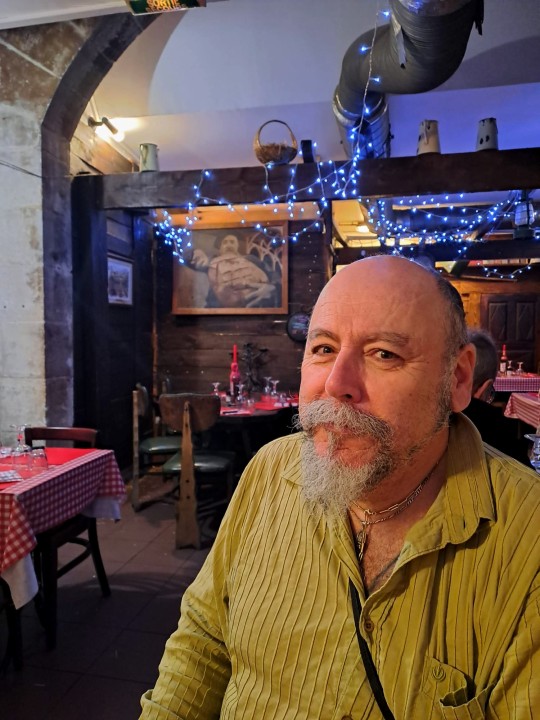
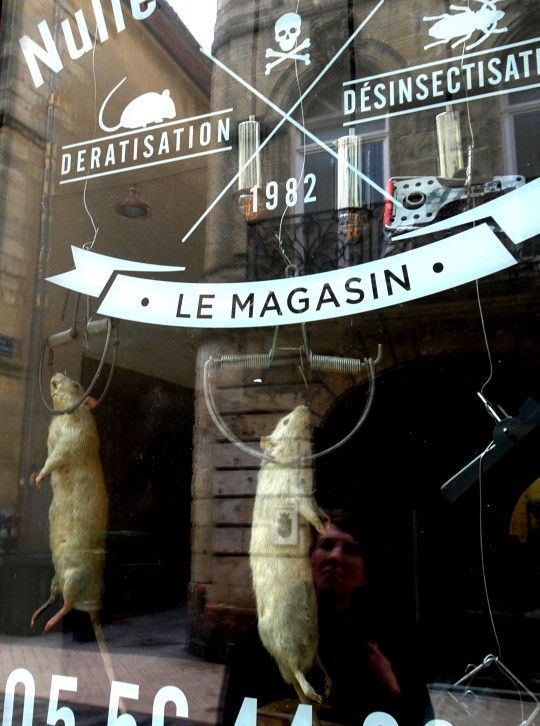
Ca y est ! Je reviens de mon périple dans l'Ouest pour retrouver des ami(e)s lointain(e)s ! Première étape, Isabelle en Gironde, vers Libourne…
Nous passons une journée à Bordeaux.
La rue du Parlement, ex Rue Royale, ex rue ???. Puis avec Isa, on se régale au resto "Chez les Ploucs" avec des croustilles de porc (des travers)
Enfin, moins appétissante, la belle devanture décorée de rats, rue du Pas-Saint-Georges
#bordeaux#aquitaine#gironde#rue des faussets#rues du pas-saint-georges#culinaire#cuisine#gastronomie#chez les ploucs#croustilles de porc#rue du parlement#rue royale#rat#raticide#rats#tapette#moustache#isabelle
2 notes
·
View notes
Note
I understand the story of marat and his assassination event
But who is lepeletier?
Because I saw a drawing for him by louis David and I learned about his death which happen to be the same as Marat so yeah .. I wanna know about him.
According to the biography Michel Lepeletier de Saint-Fargeau, 1760-1793 (1913), its subject of study was born on 29 May 1760, in his family home on rue Culture-Sainte-Catherine, a building which today is the Bibliothèque Historique de la Ville de Paris. His family belonged to the distinguished part of the robe nobility. At the death of his father in 1769, Lepeletier was both Count of Saint-Fargeau, Marquis of Montjeu, Baron of Peneuze, Grand Bailiff of Gien as well as the owner of 400,000 livres de rente. For five years he worked as avocat du roi at Châtelet, before becoming councilor in Parliament in 1783, general counsel in 1784 and finally taking over the prestigious position of président à mortier at the Parlement of Paris from his father in 1785. On May 16 1789, Lepeletier was elected to represent the nobility at the Estates General. On June 25 the same year he was one of the 47 nobles to join the newly declared National Assembly, two days before the king called on the rest of the first two estates to do so as well. A month later, during the night of August 4 1789, he was in the forefront of those who proposed the suppression of feudalism, even if, for his part, this meant losing 80 000 livres de rente. Four days later he wrote a letter to the priest of Saint-Fargeau, renouncing his rights to both mills, furnaces, dovecote, exclusive hunting and fishing, insence and holy water, butchery and haulage (the last four things the Assembly hadn’t ruled on yet). When the Assembly on June 19 1790 abolished titles, orders, and other privileges of the hereditary nobility, Lepeletier made the motion that all citizens could only bear their real family name — ”The tree of aristocracy still has a branch that you forgot to cut..., I want to talk about these usurper names, this right that the nobles have arrogated to themselves exclusively to call themselves by the name of the place where they were lords. I propose that every individual must bear his last name and consequently I sign my motion: Michel Lepeletier” — and the same year he also, in the name of the Criminal Jurisprudence Committee, presented a report on the supression of the penal code and argued for the abolition of the death penalty. After the closing of the National Assembly in 1791, Lepeletier settled in Auxerre to take on the functions of president of the directory of Yonne, a position to which he had been nominated the previous year. He did however soon thereafter return to Paris, as he, following the overthrow of the monarchy, was one of few former nobles elected to the National Convention, where he was also one of even fewer former nobles to sit together with the Mountain. In December 1792 he started working on a public education plan. On January 17, Lepeletier voted for death in the ongoing trial of Louis XVI (saying only ”I vote for death” without giving any further motivation) Three days later, the former king was sentenced to said penalty. That night, Lepeletier went over to Palais-Égalité (former Palais-Royal) where he dined everyday. The next day, his friend and fellow deputy Nicolas Maure could report the following to the Convention:
Citizens, it is with the deepest affection and resentment of my heart that I announce to you the assassination of a representative of the people, of my dear colleague and friend Lepelletier, deputy of Yonne; committed by an infamous royalist, yesterday, at five o'clock, at the restaurateur Fevrier, in the Jardin de l'Égalité. This good citizen was accustomed to dining there (and often, after our work, we enjoyed a gentle and friendly conversation there) by a very unfortunate fate, I did not find myself there; for perhaps I could have saved his life, or shared his fate. Barely had he started his dinner when six individuals, coming out of a neighboring room, presented themselves to him. One of them, said to be Pâris, a former bodyguard, said to the others: There's that rascal Lepeletier. He answered him, with his usual gentleness: I am Lepeletier, but I am not a rascal. Paris replied: Scoundrel, did you not vote for the death of the king? Lepelletier replied: That is true, because my confidence commanded me to do so.Instantly, the assassin pulled a saber, called a lighter, from under his coat and plunged it furiously into his left side, his lower abdomen; it created a wound four inches deep and four fingers wide. The assassin escaped with the help of his accomplices. Lepeletier still had the gentleness to forgive him, to pray that no further action would be taken; his strength allowed him to make his declaration to the public officer, and to sign it. He was placed in the hands of the surgeons who took him to his brother, at Place Vendôme. I went there immediately, led by my tender friendship, and my reverence for the virtues which he practiced without ostentation: I found him on his death bed, unconscious. When he showed me his wound, he uttered only these two words: I'm cold. He died this morning, at half past one, saying that he was happy to shed his blood for the homeland; that he hoped that the sacrifice of his life would consolidate Liberty; that he died satisfied with having fulfilled his oaths.
This was the first time a Convention deputy had gotten murdered, and it naturally caused strong reactions. Already the same session when Maure had announced Lepeletier’s death, the Convention ordered the following:
There are grounds for indictment against Pâris, former king's guard, accused of the assassination of the person of Michel Lepelletier, one of the representatives of the French people, committed yesterday.
[The Convention] instructs the Provisional Executive Council to prosecute and punish the culprit and his accomplices by the most prompt measures, and to without delay hand over to its committee of decrees the copies of the minutes from the justice of the peace and the other acts containing information relating to this attack.
The Decrees and Legislation Committees will present, in tomorrow's session, the drafting of the indictment.
An address will be written to the French people, which will be sent to the 84 departments and the armies, by extraordinary couriers, to inform them of the crime against the Nation which has just been committed against the person of Michel Lepelletier, of the measures that the National Convention has taken for the punishment for this attack, to invite the citizens to peace and tranquility, and the constituted authorities to the most exact surveillance.
The entire National Convention will attend the funeral of Michel Lepelletier, assassinated for having voted for the death of the tyrant.
The honors of the French Pantheon are awarded to Michel Lepelletier, and his body will be placed there.
The president is responsible for writing, on behalf of the National Convention, to the department of Yonne, and to the family of Lepelletier.
The next day, January 22, further instructions were given regarding Lepeletier’s funeral:
On Thursday January 24, Year 2 of the Republic, at eight o'clock in the morning, will be celebrated, at the expense of the Nation, the funeral of Michel Lepeletier, deputy of the department of Yonne to the National Convention.
The National Convention will attend the funeral of Michel Lepeletier in its entirety. The executive council, the administrative and judicial bodies will attend it as well.
The executive council and the department of Paris will consult with the Committee of Public Instruction regarding the details of the funeral ceremony.
The last words spoken by Michel Lepeletier will be engraved on his tomb, they are as follows: “I am happy to shed my blood for the homeland; I hope that it will serve to consolidate Liberty and Equality; and to make their enemies recognized.”
In number 27 (January 27 1793) of Gazette Nationale ou Le Moniteur Universel, the following long description was given over Lepeletier’s funeral, held three days earlier:
The funeral of Lepeletier Saint-Fargeau was celebrated on Thursday 24 with all the splendor that the severity of the weather and the season allowed, but with such a crowd that it could have been the most beautiful day of the year. At ten o'clock in the morning his deathbed was placed on the pedestal where the equestrian statue of Louis XVI previously stood, on Place Vendôme, today Place des Piques. One went up to the pedestal by two staircases, on the banisters of which were antique candelabras. The body was lying on the bed with the bloody sheets and the sword with which he had been struck. He was naked to the waist, and his large and deep wound could be seen exposed. These were the mournful and most endearing part of this great spectacle. All that was missing was the author of the crime, chained, and beginning his torture by witnessing the sight of the triumph of Saint-Fargeau. As soon as the National Convention and all the bodies that were to form courage were assembled in the square, mournful music was played. It was, like almost all those which has embellished our revolutionary festivals, the composition of citizen Gossec. The Convention was ranged around the pedestal. The citizen in charge of the ceremonies presented the President of the Convention with a wreath of oak and flowers; then the president, preceded by the ushers of the Convention and the national music, went around the monument, and went up to the pedestal to place the civic crown on Lepeletier's head: during this time, a federate gave a speech; the president dismounted, the procession set out in the following order: A detachment of cavalry preceded by trumpets with fourdincs. Sappers. Cannoneers without cannons. Detachment of veiled drummers. Declaration of the rights of man carried by citizens. Volunteers of the six legions, and 24 flags. Drum detachment. A banner on which was written the decree of the Convention which ordered the transport of Lepeletier's body to the Pantheon. Students of the homeland. Police commissioners. The conciliation office. Justices of the peace. Section presidents and commissioners. The commercial court. The provisional criminal court. The department’s fix courts. The electorate. The provisional criminal court. The department's criminal courts fix. The municipality of Paris. The districts of Saint-Denis and the village of L’Égalité. The Department. Drum detachment. The seal of the 84, worn by Federates. The provisional executive council. National Convention Guard Detachment. The court of cassation. Figure of Liberty carried by citizens. The bloody clothes worn at the end of a national pike, deputies marching in two columns. In the middle of the deputies was a banner where Lepeletier's last words were written: "I am happy to shed my blood for my homeland, I hope that it will serve to consolidate Liberty and Equality, and to make their enemies known.”
The body carried by citizens, as it was exhibited on the Place des Piques. Around the body, gunners, sabers in hand, accompanied by an equal number of Veterans. Music from the National Guard, who performed funeral tunes during the march. Family of the dead. Group of mothers with children. Detachment of the Convention Guard. Veiled drums. Volunteers of the six legions and 24 flags. Veiled drums. Volunteers of the six legions and 24 flags. Veiled drums. Volunteers of the six legions and 24 flags. Veiled drums. Armed federations. Popular societies. Cavalry and trumpets with fourdines. On each side, citizens, armed with pikes, formed a barrier and supported the columns. These citizens held their pikes horizontally, at hip height, from hand to hand. The procession left in this order from the Place des Piques, and passed through the streets St-Honoré, du Roule, the Pont-Neuf, the streets Thionville (former Dauphine), Fossés Saint-Germain, Liberté (former Fossés M. le Prince), Place Saint-Michel and Rue d'Enfer, Saint-Thomas, Saint-Jacques and Place du Panthéon. It stopped front of the meeting room of the Friends of Liberty and Equality; opposite the Oratory, on the Pont-Neuf, opposite the Samaritaine; in front of the meeting room of the Friends of the Rights of Man; at the intersection of Rue de la Liberté; Place Saint-Michel and the Pantheon. Arriving at the Pantheon, the body was placed on the platform prepared for it. The National Convention lined up around it; the band, placed in the rostrum, performed a superb religious choir; Lepeletier's brother then gave a speech, in which he announced that his brother had left a work, almost completed, on national education, which will soon be made public; he ended with these words: I vote, like my brother, for the death of tyrants. The representatives of the people, brought closer to the body, promised each other union, and swore on the salvation of the homeland. A big chorus to Liberty ended the ceremony.
According to Michel Lepeletier de Saint-Fargeau, 1760-1793 (1913), civic festivals in honor of Lepeletier were celebrated in all sections of Paris, as well as the towns of Arras, Toulouse, Chaumont, Valenciennes, Dijon, Abbeville and Huningue. Lepeletier’s body did however only get to rest in the Panthéon for a little more than two years, as on February 15 1795, the Convention ordered it exhumed, at the same time as that of Marat. It was instead buried in the park surrounding Château de Ménilmontant, the properly of which the ancestor Lepeletier de Souzy had purchased in the 17th century and that still remained in the family.
One day after the funeral, January 25, Lepeletier’s only child, the ten and a half year old Susanne, who had already lost her mother ten years before the murder of her father, was brought before the Convention by her step-mother and two paternal uncles Amédée and Félix. It was Félix who had held a speech during the funeral and he would continue to work for his seven years older brother’s memory afterwards too, offering a bust of him to the Convention on February 21 1793, (on the proposal of David, it was placed next to the one of Brutus), reading his posthumous work on public education to the Jacobins on July 19 1793, and even writing a whole biography over his life in 1794 (Vie de Michel Lepeletier, représentant du peuple français, assassiné à Paris le 20 janvier 1793 : faite et présentée a la Société des Jacobins).
The president announces that the widow of Michel Lepelletier, his two brothers and his daughter, request to be admitted to the bar, to testify to the Convention their recognition of the honors that they have decreed in memory of their relative. It is decreed that they will be admitted immediately.
One of Michel Lepeletier’s brothers: Citizens, allow me to introduce my niece, the daughter of Michel Lepelletier; she comes to offer you and the French people her recognition of the eternity of glory to which you have dedicated her father... He takes the young citoyenne Lepelletier in his arms, and makes her look at the president of the Convention... My niece, this is now your father... Then, addressing the members of the Convention, and the citizens present at the session: People, here is your child... Lepelletier pronounces these last words in an altered voice: silence reigns throughout the room, with exception for a couple of sobs.
The President: Citizens, the martyr of Liberty has received the just tribute of tears owed to him by the National Convention, and the just honor that his cold skin has received invites us to imitate his example and to avenge his death. But the name of Lepelletier, immortal from now on, will be dear to the French Nation. The National Convention, which needs to be consoled, finds relief to its pain in expressing to his family the just regrets of its members and the recognition of the great Nation of which it is the organ. The Nation will undoubtedly ratify the adoption of Michel Lepelletier's daughter that is currently being carried out by the National Convention.
Barère: The emotion that the sight of Michel Lepeletier's only daughter has just communicated to your souls must not be infertile for the homeland. Susanne Lepelletier lost her father; she must find now find one in the French people. Its representatives must consecrate this moment of all-too-just felicity to a law that can bring happiness to several citizens and hope to several families. The errors of nature, the illusions of paternity, the stability of morals, have long demanded this beautiful institution of the Romans. What more touching time could present itself at the National Convention to pass into French legislation the principle of adoption, than that when the last crimes of expiring tyranny deprived the homeland of one of its ardent defenders and Susanne Lepelletier of a dear father! Let the National Convention therefore give today the first example of adoption by decreeing it for the only offspring of Lepelletier; let it instruct the Legislation Committee to immediately present the bill on this interesting subject. I ask that the homeland adopt through your organ Susanne Lepelletier, daughter of Michel Lepelletier, who died for his country; that it decrees that adoption will be part of French legislation, and instructs its Legislation Committee to immediately present the draft decree on adoption.
This proposal is unanimously approved.
Susanne being adopted by the state would however lead to a fierce debate when, in 1797, this ”daughter of the nation” wished to marry a foreigner. For this affair, see the article Adopted Daughter of the French People: Suzanne Lepeletier and Her Father, the National Assembly (1999)
Right after Barère’s intervention, David took to the rostrum:
David: Still filled with the pain that we felt, while attending the funeral procession with which we honored the inanimate remains of our colleagues, I ask that a marble monument be made, which transmits to posterity the figure of Lepelletier , as you clearly saw, when it was brought to the Pantheon. I ask that this work be put into competition.
Saint-André: I ask that this figure be placed on the pedestal which is in the middle of Place Vendôme... (A few murmurs arise)
Jullien: I ask that the Convention adopt in advance, in the name of the homeland, the children of the defenders of Liberty, who, for similar reasons, could be immolated in the vengeance of the royalists.
All these proposals are referred to the Legislation and Public Instruction Committees.
On Maure's proposal, the Assembly orders the printing of the speeches delivered yesterday at the Panthéon, by one of Michel Lepelletier's brothers, Barère and Vergniaux.
If it would appear David never got to make a marble monument of Lepeletier, on March 28 1793, he could nevertheless present the following painting of his to the Convention, which isn’t just a little similar to his La Mort de Marat.
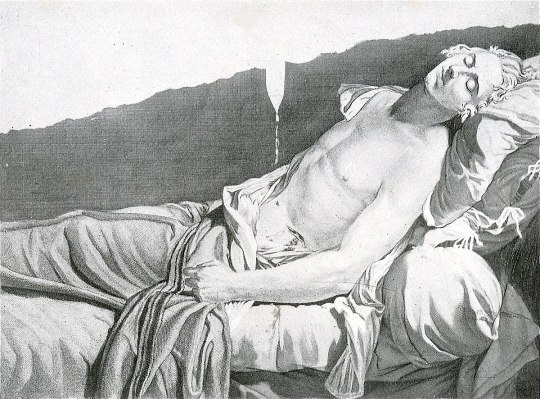
(This image is an engraving of the actual painting, which has gone missing)
After Marat on July 13 1793 (the very same day the plan for public education Lepeletier had been working on was presented to the Convention by Robespierre) became the second assassinated Convention deputy, we find several engravings etc, depicting the two ”martyrs of liberty” side by side.
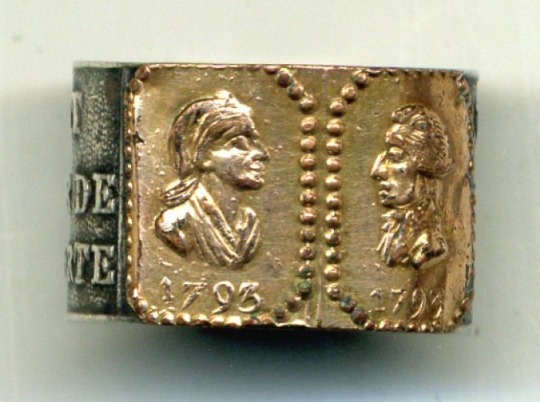



In the following months, even more people would be join the two, such as Joseph Chalier, a lyonnais politician executed on July 17 1793 and Joseph Bara, a fourteen year old republican drummer boy killed in the Vendée by the pro-Monarchist forces.

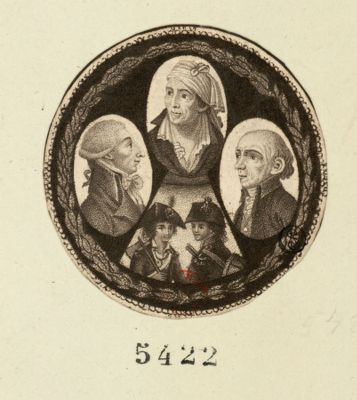
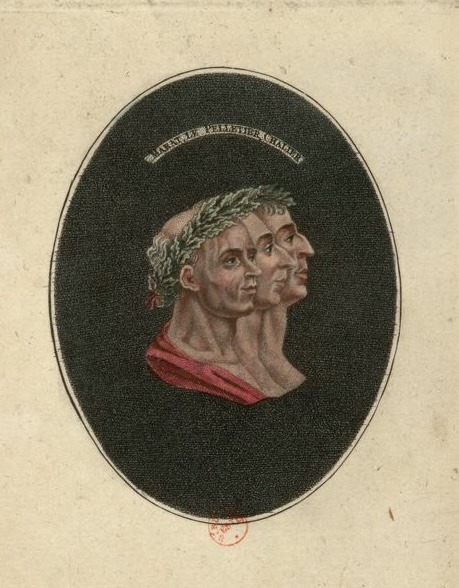

Lepeletier’s murderer, 27 year old Philippe Nicolas Marie de Pâris, a man who the minister of justice described as "former king's guard, height five pieds, five pouces, barbe bleue, and black hair; swarthy complexion, fine teeth, dressed in a gray cloak, green lapels and a round hat” on January 21, went into hiding right after his deed. In spite of his description being published in the papers and a considerable sum of money being promised to whoever caught him, Pâris managed to flee Paris and settled for a country house of an acquaintance near Bourget. He there ran into a cousin of one of the owners. When Pâris asked for food and a bed, he was refused and instead disappeared into the night again. In the evening of January 28 he arrived in Forges-les-Eaux and stopped at an inn, where he came under suspicion once he started cutting his bread with a dagger after which he locked himself into his room. The following morning he woke up with a start as five municipal gendarmes came bursting into his room and told him to come with them. Pâris responded that he would, but in the next second he had picked up his hidden pistol, placed it into his mouth, and pulled the trigger. Searching the dead body, the gendarmes found Pâris’ baptism record (dated November 12 1765) and dismissal from the king's guard (dated June 1 1792), on the latter of which had been written the following:
My certificate of honor. Do not trouble anyone. No one was my accomplice in the fortunate death of the scoundrel de Saint-Fargeau. Had I not run into him, I would have carried out a more beautiful action: I would have purged France of the patricide, regicide and parricide d’Orléans. The French are cowards to whom I say: Peuple dont les forfaits jettent partout l'effroi, Avec calme et plaisir j'abandonne la vie. Ce n'est que par la mort qu'on peut fuir l'infamie Qu'imprime sur nos fronts le sang de notre roi. Signed by Paris the older, guard of the king, assassinated by the French.
Learning about what had happened, the Convention tasked Tallien and Legrand with going to Forges-les-Eaux and making sure the dead man really was Pânis. Having come to the conclusion that this was indeed the case, the deputies briefly discussed whether the body ought to be brought back to Paris, but it was decided it would be better if it was just buried "with ignominy.” It was therefore instead taken into the nearby forest in a wheelbarrow and thrown into a six feet deep hole.
Finally, here are some other revolutionaries simping for honoring Lepeletier’s memory just because I can:
…a tragic event took place the day before the execution [of the king]. Pelletier, one of the most patriotic deputies, and who had voted for death, was assassinated. A king's guard made a wound three fingers wide with a saber: he died this morning. You must judge the effect that such a crime has had on the friends of liberty. Pelletier had an income of six hundred thousand livres; he had been président à mortier in the Parliament of Paris; he was barely thirty years old; to many talents, he added the most estimable of virtues. He died happy, he took to his grave the idea, consoling for a patriot, that his death would serve the public good. Here then is one of these beings whom the infamous cabal who, in the Convention, wanted to save Louis and bring back slavery, designated to the departments as a Maratist, a factious, a disorganizer... But the reign of these political rascals is finished. You will see the measures that the Assembly took both to avenge the national majesty and to pay homage to a generous martyr of liberty. Philippe Lebas in a letter to his father, January 21 1793
Ah! if it is true that man does not die entirely and that the noblest part of himself survives beyond the grave and is still interested in the things of life, come then, dear and sacred shadow, sometimes to hover above the Senate of the nation that you adorned with your virtues; come and contemplate your work, come and see your united brothers contributing to the happiness of the homeland, to the happiness of humanity. Marat in number 105 (January 23 1793) of Journal de la République Française
O Lepeletier! Your death will serve the Republic: I envy your death. You ask for the honors of the Pantheon for him, but he has already collected the prize of martyrdom of Liberty. The way to honor his memory is to swear that we will not leave each other without having given a constitution to the Republic. Danton at the Convention, January 21 1793
O Le Peletier, you were worthy to die for your homeland under the blows of its assassins! Dear and sacred shadow, receive our wishes and our oaths! Generous citizen, incorruptible friend of the truth, we swear by your virtues, we swear by your fatal and glorious death to defend against you the holy cause of which you were the apostle; we swear eternal war against the crime of which you were the eternal enemy, against the tyranny and treason of which you were the victim. We envy your death and we will know how to imitate your life. They will remain forever engraved in our hearts, these last words where you showed us your entire soul; ”May my death,” you said, “be useful to the homeland, may it will serve to make known the true and false friends of liberty, and I die content.” Robespierre at the Jacobins, January 23
Wednesday 23 [sic] — We went to Madame Boyer’s to see the procession. I saw the poor Saint-Fargeau. We all burst into tears when the body passed by, we threw a wreath on it. After the ceremony, we returned to my house. Ricord and Forestier had arrived. I was unable to stop my tears for some time. F(réron), La P(oype), Po, R(obert) and others came to dinner. The dinner was quite fun and cheerful. Afterwards they went to the Jacobins, Maman and I stayed by the fire and, our imaginations struck by what we had seen, we talked about it for a while. She wanted to leave, I felt that I could not be alone and bear the horrible thoughts that were going to besiege me. I ran to D(anton’s). He was moved to see me still pale and defeated. We drank tea, I supped there. Lucile Desmoulins in her diary, January 24 1793
…Pelletier's funeral took place this Thursday as I informed you in my last letter (this letter has gone missing). The procession was immense; it seemed that the population of Paris had doubled, to honor the memory of this virtuous citizen. The mourning of the soul was painted on all the faces: it was especially noticed that the people were extremely affected, which proves that they keenly felt the price of the friend they had lost. Arriving at the Pantheon, Lepelletier's body was placed on the platform prepared for it; his brother delivered a speech which was applauded with tears; Barère succeeded him. Then the members of the Convention, crowding around the body of their colleague, promised union among themselves, and took an oath to save the country. God grant that we have not sworn in vain, that we finally know the full extent of our duties, and that we only occupy ourselves with fulfilling them! In yesterday's session, Pelletier's daughter, aged eight [sic], was presented to the National Convention, which immediately adopted her as a child of the homeland. Georges Couthon in a letter written January 26 1793
How could I be so base as to abandon myself to criminal connections, I who, in the world, have never had more than one close friend since the age of six? (he gestures towards David's painting). Here he is! Michel Lepeletier, oh you from whom I have never parted, you whose virtue was my model, you who like me was the target of parliamentary hatred, happy martyr! I envy your glory. I, like you, will rush for my country in the face of liberticidal daggers; but did I have to be assassinated by the dagger of a republican! Hérault de Sechelles at the Convention, December 29 1793
For a collection of Lepeletier’s works, see Oeuvres de Michel Lepeletier Saint-Fargeau, député aux assemblées constituante et conventionnelle, assassiné le 20 janvier 1793, par Paris, garde du roi (1826)
#hérault and lepeletier being bffs since age six was new information for me#also i think Augustin just found a rival in ”most loyal little bro in the revolution”#frev#michel lepeletier#lepeletier de saint-fargeau#french revolution#ask#long post
63 notes
·
View notes
Text
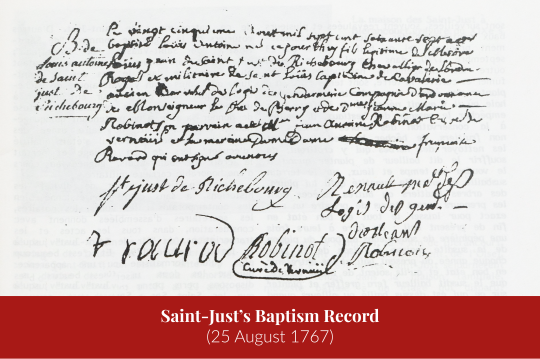
Louis-Antoine Saint-Just: the Beginning
On the day of his birth, 25th of August 1767, Louis-Antoine was baptized by his maternal uncle ( priest Edmond-Léonard Robinot) in the church of Saint-Aré in Decize.
Located between Nevers and Moulins, the small town of Decize then had forges, a plaster factory, coal mines, and warehouses where Burgundy wines were stored. Louis Antoine was probably born in the house of his maternal grandfather, Léonard Robinot, on the Quai du Pont-de-Loire, at the corner of Rue des Pêcheurs. There is a whole family drama about his parents' marriage and his grandfather being against it, but that's a story for another time!
His godparents were his second uncle, Antoine Robinot and Françoise Ravard the wife of a lawyer in the Parlement. He was named Louis after his father and Antoine after his godfather.


The baptismal font is in the archive of the church of Saint-Aré. We can't be sure, but since it's a 18th century font it might have been used for the baptism of baby Saint Just...
38 notes
·
View notes
Text
Découvrez l'EuroVelo 6 : une incroyable aventure à vélo de l'Atlantique à la Mer Noire

L'EuroVelo 6 est un parcours cyclable qui traverse l'Europe, reliant l'Océan Atlantique à la Mer Noire. Suivant les côtes, fleuves et châteaux, cette route offre des paysages variés et exceptionnels à explorer en selle. Dans cet article, nous vous présentons un itinéraire détaillé pour découvrir cette voie unique sur deux roues. Le parcours global de l'EuroVelo 6 Ce tracé emblématique s'étend sur plus de 4 000 km, traversant dix pays européens et empruntant principalement des voies vertes ou des pistes cyclables sécurisées. L'EuroVelo 6 suit les cours d’eau majeurs tels que le Rhin, le Danube et la Loire, offrant ainsi des panoramas époustouflants et des sites historiques à chaque étape du trajet. Les différentes sections de l'EuroVelo 6 Afin de faciliter votre voyage, l'itinéraire complet se divise en plusieurs sections, que vous pouvez réaliser séparément ou dans leur ensemble : - La section atlantique (France) : de Nantes à Bâle. - La section rhénane (Allemagne, Suisse, France) : de Bâle à Passau. - La section danubienne (Allemagne, Autriche, Slovaquie, Hongrie) : de Passau à Budapest. - La section centre-européenne (Croatie, Serbie, Roumanie, Bulgarie) : de Budapest au delta du Danube. - La section finale (Roumanie, Bulgarie, Turquie) : du delta du Danube à la Mer Noire. Les étapes phares de l'Itinéraire vélo EuroVelo 6 Découvrez quelques-uns des temps forts de cet itinéraire qui marqueront votre périple : Nantes Située sur l'estuaire de la Loire, Nantes est une ville pleine de charme dotée d'un riche patrimoine historique et culturel. Avant de partir pour l'EuroVelo 6, prenez le temps de visiter le château des ducs de Bretagne, la cathédrale Saint-Pierre-et-Saint-Paul ou encore les célèbres Machines de l'île. Le Val de Loire Inscrit au patrimoine mondial de l'UNESCO, le Val de Loire vous émerveillera par ses paysages bucoliques et ses châteaux emblématiques comme ceux de Chambord, Chenonceau, Amboise ou Azay-le-Rideau. Ne manquez pas non plus les jardins de Villandry et les dégustations de vins locaux dans les caves troglodytiques. Strasbourg Capitale européenne et alsacienne, Strasbourg est une étape incontournable sur l'EuroVelo 6. Admirez la magnifique cathédrale Notre-Dame, flânez dans le quartier pittoresque de la Petite France et traversez le Rhin pour rejoindre l'Allemagne via le pont Pierre Pflimlin. Le Danube Le long du fleuve le plus long d'Europe, vous passerez par des sites spectaculaires comme les falaises calcaires de la Porte-de-Bavière, le Parc Naturel Donau-Auen en Autriche ou encore le Parc National Đerdap à la frontière serbo-roumaine. De nombreux villages typiques jalonnent également ce tronçon, permettant de découvrir les traditions locales. Budapest Surnommée la "Perle du Danube", Budapest offre un panorama unique depuis le pont Széchenyi Lánchíd avec ses collines de Buda et la plaine de Pest encadrant le fleuve. Profitez de cette étape pour visiter le château royal, les bains thermaux de Gellért ou le Parlement hongrois, puis dégustez un goulasch traditionnel dans les rues animées. Le Delta du Danube Cette zone protégée offre une biodiversité exceptionnelle et constitue un paradis pour les ornithologues avec plus de 300 espèces d'oiseaux nicheurs. Entre canaux labyrinthiques et marais sauvages, vous partirez à la découverte des traditions ancestrales de la pêche et de l'élevage qui marquent cette région unique. La Mer Noire Votre aventure sur l'EuroVelo 6 se termine sur les plages dorées de la Mer Noire, où vous pourrez célébrer votre réussite en savourant un poisson grillé accompagné d'un verre de vin local. Les stations balnéaires de Varna (Bulgarie) et Constanta (Roumanie) offrent une multitude d'animations estivales pour conclure en beauté ce périple inoubliable. Préparer son voyage sur l’EuroVelo 6 Pour profiter pleinement de ce parcours d’exception, il convient de bien préparer son voyage : - Voies cyclables : informez-vous sur les pistes accessibles et les conditions de circulation dans chaque pays traversé. - Hébergements : réservez vos étapes à l’avance, en tenant compte de la saison et du dénivelé. - Budget : prenez en compte l’ensemble des frais engagés, tels que les transports jusqu’à votre point de départ, la location ou l’achat de matériel, les repas et les visites touristiques. - Gastronomie locale : découvrez lors de votre itinéraire, les spécialités culinaires de chaque région et goûtez aux produits locaux. Avec ces quelques conseils en tête, vous voilà prêt à partir à la découverte de l'EuroVelo 6, des splendeurs naturelles et du patrimoine culturel incomparable qui marqueront ce voyage cyclotouristique hors du commun. Read the full article
2 notes
·
View notes
Text
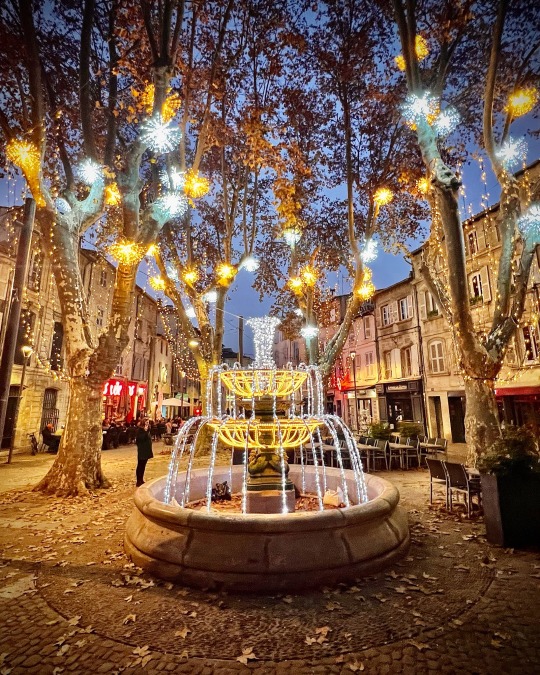
Avignon - Corps-Saints (Place des Corps-Saints)
Cette place avait été d’abord simplement nommée Place du Corps-Saint parce que les restes de Saint-Pierre de Luxembourg, cardinal, mort le 2 juillet 1387, avaient été inhumés dans le cimetière public de Saint-Michel, sur l’emplacement duquel s’éleva bientôt le somptueux monastère des Célestins.
En 1843 on remarqua que les restes de Saint-Bénézet ayant été transportés et inhumés dans le même monastère le 26 mars 1674, c’eût été Place des Corps-Saints qu’il eût fallu dire, et l’on s’empressa de rectifier ce nom, lorsque depuis trop longtemps le vent des révolutions avait également dispersé les reliques de Saint-Pierre de Luxembourg et celle de Saint-Bénézet.
À l’entrée de la place des Corps-Saints était la porte de l’ancienne enceinte de 1226, dite du Pont-rompu (Pontis fracti), et quelquefois de Rome. Tout près de là existait avant 1210 un hôpital qui tenait de ce voisinage le nom d’Hôpital de la Bienheureuse Marie du Pont-Rompu
Le pont qui faisait communiquer la rue des Trois-Faucons avec la place des Corps-Saints était très étroit, la ville le fit élargir en 1738 en y ajoutant tout l’espace qu’occupait sur la Sorgue la maison d’un nommé Blanc, qu’elle avait acquise à cet effet.
Le parc des Célestins était séparé des bâtiments de leur monastère par une rue qui, de la place des Corps-Saints, allait boutir en face de la tour des Arbalétriers.
Les moines, qui ne pouvaient aller s’y promener qu’en passant par un arceau, tentèrent souvent d’usurper cette partie de la voie publique. Ils crurent y avoir réussi en 1689 lorsque, profitant des premiers moments de la prise de possession d’Avignon par le roi de France, ils surprirent au premier président du Parlement de Provence une ordonnance qui les autorisaient à la fermer. Mais, sur les réclamations qui furent faites, ils durent la rouvrir le 12 mars 1699 et de cet incident cette voie publique conserva le nom de rue Courte-Joie.
La rue Courte-Joie disparut définitivement lorsque les nécessités de la guerre mirent l’administration centrale du Département dans l’obligation de réunir, par son arrêté du 5 Thermidor an II, le couvent des Célestins à l’hôpital militaire, auquel étaient déjà affectés les bâtiments de l’ancien monastère des Dames de Saint-Louis.
#avignon#vaucluse#original photographers#photography#photographe#photographers on tumblr#photo#france#tourism#tourisme
6 notes
·
View notes
Text
Pour me distraire de mes péripéties quotidiennes et pour me tenir au courant de l’actualité (chose que je néglige royalement ces derniers temps), je décide d’écouter un peu la radio.
Voilà donc qu’on me rappelle malgré moi ce qu’est le temps législatif programmé ! Petite créature naïve que je suis, j’avais oublié cette belle invention avec le reste de mon cours de droit constitutionnel de Licence 1.
N’ayant pas réussi à trouver cette disposition sur Légifrance, je me fonde uniquement sur ce que j’ai entendu à la radio mais le principe du temps législatif programmé est clair : on impose une limite de temps aux parlementaires pour examiner tel projet de loi.
Dans notre cas, il s’agit du projet de loi de réforme des retraites, celui qui a fait descendre les gens dans la rue il y a quelques jours à peine, et qui est décrié depuis aussi longtemps que l’idée a ne serait-ce que germé dans la tête d’un de nos dirigeants.
Pour être précise, il s’agirait de laisser 50 jours pour adopter le projet (ça sonne comme le titre d’un film catastrophe non ? Haha c’est drôle, non ?), avec 20 jours consacrés à la première lecture du texte devant l’Assemblée nationale.
Vous allez me dire “Elle est belle, la démocratie française !”, et je vous répondrais “Attendez de savoir comment le non-respect de ce délai est sanctionné !” (j’aime beaucoup les délais, c’est ma passion).
Car dans le cas où les députés n’auraient pas fini d’examiner le projet dans les 20 jours - en gros, de proposer des amendements, de les discuter, de les voter - c’est le projet initial qui sera transmis au Sénat. C’est-à-dire, le projet réalisé par le gouvernement (ou un cabinet de conseil sur rémunéré, on ne sait plus à force).
Ce qui revient à dire que les députés auront discuté pendant 20 jours et adopté des amendements et tout ça pour rien. Au-delà des 20 jours de travail parlementaire gâché (les deniers publics, tout ça tout ça), c’est un déni de démocratie tellement flagrant, tellement empreint d’impunité que j’en ai envie de vomir et / ou de pleurer.
Quelle image du Parlement, et plus généralement de la démocratie cela renvoie ?
D’un côté, on prive l’opposition de toute possibilité d’expression en les privant de leur droit d’amendement. Et le présentateur du journal de France Culture ne manquait pas de s’en réjouir : grâce à cette règle ô combien louable, on aurait donc un “vrai débat parlementaire” autour de ce projet de loi, puisque les vilains députés insoumis ne déposeraient finalement pas des milliers d’amendements. Comme par magie, un texte qui sera à coup sûr adopté avec un contenu décidé par le gouvernement non élu de France et dans les formes souhaitées par ce dernier, grâce à une règle tirée d’une loi imposée par le recours à l’article 49, 3 de la Constitution devient le fruit d’un “vrai débat parlementaire”. Tiens, reprend donc une part de parlementarisme rationalisé, ça fera du bien à ta démocratie !
D’un autre côté, les députés de la majorité sont déclarés haut et fort comme inutiles, de réels parasites qui ne servent qu’à garnir les sièges de l’Assemblée nationale puisqu’avec ou sans eux, les projets de lois sont adoptés. Et ce n’est pas sans danger pour l’idée même de démocratie : à force de voir ce simulacre de démocratie, qui ne finirait pas par penser que c’est la démocratie qui est en cause ?
Bref, tout ça pour dire : ce soir j’ai écouté 5 minutes du journal d’information de France Culture et j’ai du m’arrêter là car j’ai envie de vomir.
#rien de très neuf#le temps parlementaire programmé existe depuis 2008 ou 2009#mais une petite piqure de rappel ne fait pas de mal#histoire de ne pas oublier que notre démocratie est B E L L E#french stuff#french politics#upthebaguette
4 notes
·
View notes
Text

La fertilité de la population des pays de l'UE a été irrémédiablement endommagée par la campagne de vaxxination anti-Covid
🚨 Le sommet international Covid19, qui a réuni des personnalités du monde médical et s'est déroulé au cœur même du Parlement européen, a porté un coup fatal aux vaccinologues au sommet de l'Union européenne (UE).
Les médecins ont présenté des statistiques et des études qui montrent clairement que la fertilité de la population des pays de l'UE a été irrémédiablement endommagée par la campagne de vaxxination anti-Covid. Ils ont également condamné les autorités européennes pour avoir incité les femmes enceintes à se faire vacciner alors que les études étaient inexistantes.

Des personnalités du monde médical mondial se sont même réunies au Parlement européen lors du Sommet international Covid-19 pour débattre des problèmes majeurs posés par le vaccin à ARN messager Covid. L'un des sujets brûlants de la conférence a été les effets du vaccin Covid sur le système reproducteur, des médecins ayant signalé des dommages irréparables à la fertilité après la campagne de vaccination. Le Dr Natalia Prego, d'Espagne, a souligné que Pfizer elle-même a admis que, dans les premières heures suivant la vaccination Covid, les effets se font sentir dans d'autres organes, et pas seulement dans les muscles. "Cela a de graves conséquences. L'ARN messager est donc déposé à certains endroits, et l'idée est d'envoyer un message aux cellules pour qu'elles produisent la protéine spike. Lorsque le vaccin Covid 19 est inoculé, il atteint les ovaires et envoie un ordre de réplication génétique aux cellules pour qu'elles produisent la protéine spike. Lorsque la protéine spike se lie aux récepteurs AC2, les hormones 1 et 7, nécessaires à la synthèse des œstrogènes et de la progestérone, ne sont plus libérées. Il y a également des perturbations dans la fonction de conception, c'est-à-dire la possibilité d'implantation dans les ovaires, parce qu'il y a des changements dans l'endomètre, qui entoure l'utérus et ne permet pas le développement normal de la grossesse", a déclaré le Dr Natalia Prego.

Les médecins ont montré qu'une diminution des hormones sexuelles chez les femmes est corrélée à une diminution de la fertilité, ce qui a également été démontré par des études in vitro prouvant que la protéine du pic entraîne une diminution de la quantité d'hormones. En outre, des développements intra-utérins anormaux ont été signalés parce que le fœtus ne se développe plus normalement. "Le taux de fertilité en Espagne, par exemple, a diminué de 7 à 8 % dans la population âgée de 18 à 49 ans. Les données montrent que plus le taux de vaccination est élevé, plus le taux de fécondité et donc le taux de natalité sont bas avant 2022 et après 2022. Le même phénomène est observé dans tous les pays européens. Partout, les taux de natalité ont visiblement diminué de 7 à 10 %, et ce dès la première année suivant la campagne de vaccination anti-covidique", a déclaré le Dr Natalia Prego. Elle a conclu que des recherches plus approfondies et rigoureuses étaient nécessaires, ainsi que davantage d'autopsies et de dépistages au sein de la population, et a appelé les médecins, le 13 mai 2023, lors de la Journée des personnes affectées par les vaccins, à descendre dans la rue, à aller dans les écoles et à parler à tout le monde de ce qui s'est passé, afin que les gens ne soient pas trompés et manipulés. Ils ont modifié la définition du vaccin

Illustrations : propagande de l'OMS

... et les désinfos propagandistes/complotistes médiatiques traditionnels
#mon medecin joue au malin#mon infirmier est un fumier#mon ministre est sinistre#big pharmla#covid&corruption#covid de sens#covid au cerveau
2 notes
·
View notes
Text
Strasbourg
City in France
Région: Grand Est
Strasbourg is the capital city of the Grand Est region, formerly Alsace, in northeastern France. It's also the formal seat of the European Parliament and sits near the German border, with culture and architecture blending German and French influences. Its Gothic Cathédrale Notre-Dame features daily shows from its astronomical clock and sweeping views of the Rhine River from partway up its 142m spire

Strasbourg vue aérienne vers la cathédrale septembre 2015

Strasbourg rue Mercière 30 août 2013

The twin watchtowers of the Ponts Couverts.

Strasbourg Petite-France maison des Tanneurs et place Benjamin-Zix
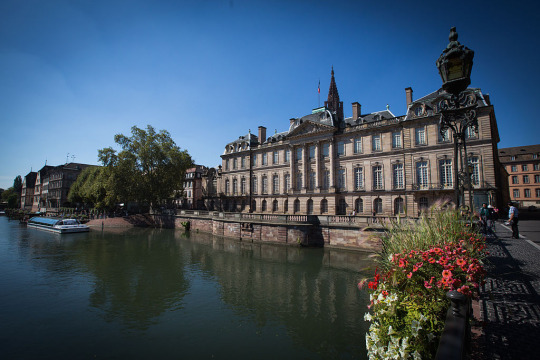

Palais Rohan- Palais du Rhin de Strasbourg (Strasbourg - Bas-Rhin - France)
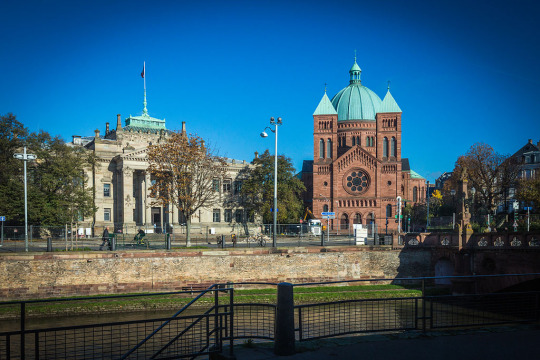
Strasbourg Palais de Justice et église Saint-Pierre-le-Jeune catholique novembre 2013

Parlement européen de Strasbourg, Architecture-Studio
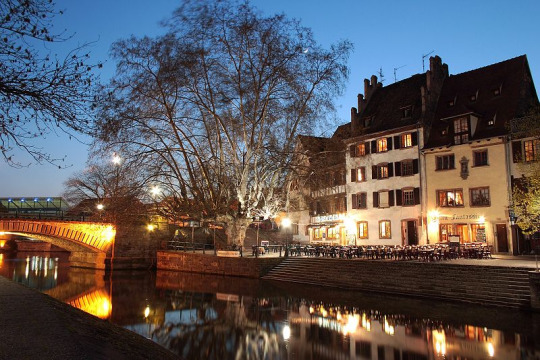
Les quais de l’Ill dans le quartier de la Petite France.

Repère Normalnull à Strasbourg.

Chasse-neige municipal en hiver.

Bateau-promenade Batorama sur l’Ill, près des ponts couverts.

Maisons à colombages dans le quartier de la Petite France.

Le parc de l'Orangerie

Le château de Pourtalès et son parc, dans le Quartier de la Robertsau.
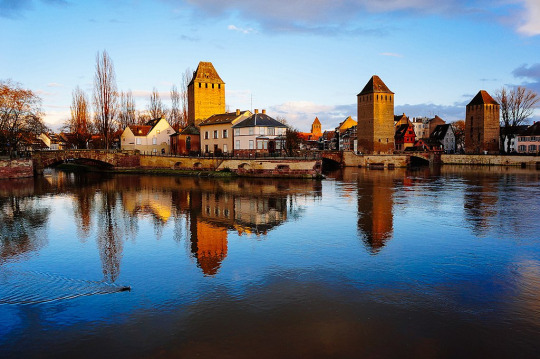
Les ponts couverts du xiiie siècle.
Area: 78.26 km2 (30.22 sq mi)
Demonym(s): Strasbourgeois (masculine); Strasbourgeoise (feminine)
Department: Bas-Rhin
Elevation: 132–151 m (433–495 ft)
Strasbourg — Wikipédia (wikipedia.org)


Strasbourg, France (by Ben Abel)
3K notes
·
View notes
Text
26 novembre : Holodomor, le génocide des Ukrainiens voulu par Moscou
Entre 19h32 et 19h33, les Ukrainiens observent une minute de silence en mémoire de la plus grave tragédie de leur histoire : la mort de 7 à 10 millions de ses habitants lors de la grande famine de 1932-1933, soit quelque 25 % à 30 % de sa population de l'époque.
À Kiev, un cortège se rend au mémorial de l'Holodomor (голодомо́р « mort de faim » en ukrainien, holod, la faim ; mor, l’extermination), par la rue Ivan Mazepa. Des milliers d'Ukrainiens en famille viennent y déposer une bougie.
Une cérémonie a également lieu à Bykivnia, localité de la banlieue de Kyiv où de très nombreux morts ont été inhumés. En 2006, Kyiv reconnaissait le caractère génocidaire de l’Holodomor, pas Moscou où les autorités arguent que la collectivisation forcée, visant à éliminer les koulaks, a provoqué des famines partout en URSS, et que l’Ukraine n’était pas spécialement visée. Kyiv y voit, au contraire, la volonté de Staline de casser la fierté ukrainienne et de détruire à jamais toute tentation d’émancipation, car ailleurs en URSS, la famille n’a pas entrainé la mort d’une telle proportion de la population. La seule exception est le Kazakhstan où l’hécatombe fut pire encore. Le génocide y est connu sous le nom d’Acharchylyk.
Le Canada où vivent un million de descendants d'Ukrainiens, organise ce même jour, quatrième samedi de novembre, des cérémonies dans plusieurs villes. À New York, également, on commémore le crime de masse.
À Paris, Le Comité représentatif de la communauté ukrainienne en France organise une cérémonie du dépôt de gerbes sur la tombe du Soldat inconnu sous l'Arc de Triomphe. Un rassemblement a lieu dans le Square Taras Chevchenko (angle rue des Saints-Pères et Bd St Germain Paris 6e). Une trentaine de pays reconnaissent l’Holodomor comme un génocide : États-Unis, Canada, Brésil, Portugal, Vatican… dernièrement, la Roumanie, la Moldavie et l’Irlande, l’Allemagne, le Parlement européen et finalemen la Belgique et la France, en mars 2023 seulement, quelques mois avant le 90e anniversaire.
En novembre 2022, une messe a été dite en l’église Saint-Sulpice, à l’initiative de l’éparchie gréco-catholique de Paris. Le pape François a invité à prier pour les victimes de « l’extermination par la faim en 1932-1933 provoquée artificiellement par Staline en Ukraine ».
#Holodomor #Ukraine #URSS #1923 #1933
Un article de l'Almanach international des éditions BiblioMonde, 26 novembre 2023
0 notes
Text
Jour 6
Ce jour, je le consacra aux personnes entravées par leurs chaînes qui bruissent.
Et curieusement, je renversa des a-prioris.
Tout d'abord sur le poids de l'église dans la vie quotidienne.
Léo de Pink Armenia me révéla qu'il était bien plus dangereux de vivre en Géorgie. Le catholicisme rend fanatique. Donc on frappe sans problème. Ici, l'église apostolique gentille ses traditions et tolère bien des bizarreries. Effectivement, chaque semaine il accueille des ados brutalement expulsés de chez eux, ou qui ont réussi à s'échapper de la chambre où les parents les avaient verrouillé, mais c'est avant tout une histoire de honte familiale, plutôt qu'un verdict de l'église.
D'ailleurs, ce prêtre qui a failli renverser le gouvernement, en fait a failli d'après les médias, car en fait a voulu, mais en fait en 3 jours ils sont passés de foules à peu de monde. Finalement, même ce prêtre patriote, les arméniens s'en méfient.
Tu sais, il suffit d'une personne pour que tout change. As tu remarqué que tous les trottoirs de cette ville sont accessibles au fauteuil roulant? Ils ont tous une rampe.
Musheg met à mal ma théorie personnelle que ces douceurs pour handicapés étaient un héritage soviétique.
Non non, cela date de moins de 10 ans.
Tout cela car une parlementaire vit en fauteuil roulant. Elle était d'abord élue à la mairie puis au parlement. On peut donc suivre son action à la trace.
Ce qui ne m'empêche pas de porter plainte contre l'état pour discrimination envers les handicapés. Une première dans l'histoire de ce pays. J'attends la réponse... dans 15 jours.
Je remarque la similitude d'action entre Pink Armenia et DRA... Tous les 2 agissent avant tout via les réseaux sociaux.
Avant tout rendre visible et créer des discussions hors du cercle des concernés, et ainsi, progressivement, modifier les mentalités.
L'école inclusive pour les handicapés, on en est à la 1ère génération et la 2ème génération va profiter d'un accueil plus adapté.
Pour les handicapés mentaux, il n'y a rien. Ils se retrouvent souvent à la rue.
Tout se complique. On a vécu une vague de migrants russes et biélorusses, puis soudain l'attaque azéri et en 2 jours 100 000 réfugiés à accueillir, d'un coup... Les loyers ont triplé. C'est difficile.
Certains réfugiés handicapés, ou encore en état de choc, ne sont pas sortis de leur chambre depuis 1 an !
D'un autre coté, je peux te dire qu'il y a des Russes qui ont fui juste car les magasins occidentaux fermés chez eux... Et qu'ils désirent continuer de bien vivre dans une rue élégante et commerçante.
Mais sinon oui, on s'apprête à accueillir des réfugiés de Géorgie quand les lois antiLGBT vont être appliquées.
...
Tout efféminé qu'il est, je devine en Léo la capacité de casser la mâchoire s'il le faut.
Il dit:
On a fermé l'ancien lieu quand on a ressenti la liberté de vivre comme on voulait. Maintenant notre lieu est tenu secret pour mieux aider les ados expulsés de leurs familles.
Je prépare un Drag Show dans un Club.
Il s'agit pas de copier le phénomène américain.
Il y a toujours eu partout des spectacles de travestissements... En France autour de la mode, en Italie et en Arménie autour de la comédie ...
En fait, il s'agit rien moins que d'un rituel du temps des cavernes. Il s'agit de danser autour d'un feu et de s'échanger de l'énergie vitale entre humains pour nous apporter de la joie de vivre.
...
C'est oppressant de vivre sous pression. La peur constante de se faire massacrer. Nos parents et nos grands parents nous parlent sans cesse du génocide. Les frères et les cousins nous parlent des azéris et de la prochaine guerre. On a du mal à respirer... en dessous notre calme apparent... On étouffe sous pression
...
Les seuls moments de calmes libérateurs se situent dans les courts interstices du rire.
...

0 notes
Text
Kénya : une manifestation massive contre la loi de finances sombrée dans le chaos, au moins un mort recensé
Protestant contre la mise en application du projet de loi de finances 2024, des milliers de citoyens kényans ont investi les rues de Nairobi, ce mardi 25 juin. D’après Amnesty international, des violences ont éclaté et les agents de l’ordre ont tiré à balles réelles. Au moins un mort a été recensé et les manifestants ont mis le feu dans une partie du Parlement. À Nairobi, capitale du Kénya,…

View On WordPress
0 notes
Text


Lundi 17 juin 2024
Le parti de l’étranger
Ce fut une partie de la noblesse après 1789 ; ce fut le PCF du temps de l’URSS ; LFI est devenu de nos jours le parti de l’étranger.
Du Hamas et de de tous ceux qui veulent non seulement la défense des palestiniens, mais aussi et surtout la suppression de l’État d’Israël. Donc de l’Iran des mollahs, du Yémen et de la « rue arabe » de par le monde.
LFI n’est plus tout à fait le parti de Jean-Luc Mélenchon, c’est devenu le parti de Rima Hassan, élue députée européenne, militante franco-palestienne, qui va mettre au pas Manon Aubry et tous les dirigeants de LFI.
La prochaine étape sera, à n’en pas douter, non seulement le chaos au Parlement et dans toute la France - c’est bien parti - mais aussi l’initiation, l’installation idéologique, l’instillation en France et en Europe d’une République islamique en lien avec l’Iran, le Yémen, la Turquie… et de tous les modèles de la « démocratie islamique » !
Tout cela prendra du temps, plus ou moins en fonction notamment du vote aux prochaines élections législatives et de l’intensité du sursaut qui suivra.
Un sursaut qui permettra peut-être de retarder l’inévitable bouleversement démographique et idéologique.
François BAUDILLON *
0 notes
Text
Le consentement sexuel : respect et communication

Tandis qu’en Alabama, mercredi 15 mai, les 25 élus américains décident l'interdiction quasi totale de l'avortement (même en cas d'inceste ou de viol). Il est nécessaire de rappeler ce qu’est le consentement sexuel. Le consentement sexuel est l’accord qu’une personne donne à son partenaire au moment de participer à une activité sexuelle. Le viol est l’acte par lequel une personne est contrainte à un acte sexuel par la force, la surprise, la ruse ou, plus largement sans son consentement. En savoir plus sur le consentement sexuel féminin. Pour commencer, Le consentement signifie que les deux personnes donnent de façon libre et éclairé leur accord. Elle a dit oui, il a dit oui, ils ont dit oui. Par conséquent, si le choix n'est pas donné de façon volontaire, c’est un viol. Si la personne n’est pas consciente, c’est un viol. Si la personne dit oui puis qu’elle décide que c’est non et que tu continues, c’est un viol. Aux yeux de la loi, il n’existe pas de façon précise d’exprimer son consentement. C’est avec la parole, ou le comportement, ou les deux qu’on le donne. Ensuite, il est indispensable de s’assurer que l’autre en a vraiment envie : une personne ne doit pas se sentir prisonnière d’un acte sexuel. On ne dit pas oui pour faire plaisir ou par peur de décevoir. La sexualité se vit seul, à deux ou à plusieurs, avec le totale accord et l'envie de chaque individu. En Irlande, lors d’un procès pour viol sur mineure, l’avocate de l’accusé pour le défendre a présenté le string de la victime. En effet, selon elle, le sous-vêtement est la preuve que la jeune femme consentait à ce rapport. Or les vêtements ne sont pas un signe de consentement, chaque femme est libre de porter ce qui lui plait. Rien ne justifie un viol. Pourtant l’accusé a été lamentablement déclaré non coupable et a été acquitté par le tribunal le 6 novembre 2018. Suite à cette affaire, le 13 novembre 2018, la députée Ruth Coppinguer a brandi un string au parlement irlandais et a dénoncé ainsi l’humiliation et la bêtise de la décision finale. Quant aux femmes, elles sont des milliers à avoir réagit. Manifestations dans les rues et tweets incessant avec le hashtag #thisisnotconsent accompagné par une photographie de leurs sous-vêtements. Rien ne justifie un viol : une injustice inacceptable Le viol est un crime odieux qui laisse des cicatrices profondes, tant physiques que psychologiques, sur ses victimes. Rien ne peut justifier un tel acte de violence. Il est impératif de comprendre que, quels que soient les circonstances ou les comportements de la victime, le viol reste un acte de domination et de brutalité inexcusable. Les mythes et les préjugés entourant le viol, tels que ceux impliquant les vêtements ou les actions de la victime, perpétuent une culture de culpabilisation et de stigmatisation. Il est crucial de démanteler ces idées fausses et de reconnaître que la responsabilité incombe uniquement à l'agresseur. Le consentement doit être clair, libre et volontaire; tout acte sexuel sans ce consentement explicite est un viol. Les impacts du viol sont dévastateurs et durables. Les victimes peuvent souffrir de troubles de stress post-traumatique, de dépression et d'anxiété, et leur chemin vers la guérison est souvent long et difficile. La société a le devoir de soutenir les survivants, de leur offrir des ressources et un environnement sécurisant pour se reconstruire. En fin de compte, il est de notre responsabilité collective de lutter contre le viol et de promouvoir une culture de respect et d'égalité. En éduquant, en sensibilisant et en défendant les droits des victimes, nous pouvons œuvrer pour un monde où aucune personne ne souffre de cette atrocité. Ce procès témoigne d’une grande injustice et de l’absurdité dont l’homme peut faire preuve à l’égard de la femme. En effet, un vêtement n’a encore jamais parlé et dit oui. Il est nécessaire de rappeler que le consentement est un accord commun fondé sur le respect et la confiance. N'hésite pas à partager ton point de vue et à rappeler à chacun l'importance du consentement. Read the full article
0 notes
Link
0 notes
Text
Ce qui est bien avec les Russes, contrairement aux homosexuels du gouvernement français, c’est qu’ils parlent un langage facilement compréhensible par le plus grand nombre.

Il faut remercier M. Piotr Tolstoï, le Vice-Président de la Douma, pour ce message qui a pour but de faire comprendre aux Français les conséquences des agissements irresponsables de l’encocaïné de l’Élysée, phénoménale garce des juifs.

Macron va battre Poutine grâce à Photoshop
Au Kremlin, ça doit être la panique, face à ce regain de virilité bisexualisante.

Qui peut penser que mettre ce clown en scène de la sorte est de nature à intimider qui que ce soit, et surtout les Russes ? Ces gens vivent dans une dimension parallèle.
Ce n’est pas la première fois dans l’histoire que la déconnexion des élites dirigeant la France aboutit à un désastre tragi-comique. C’est d’ailleurs ce qu’il faut à ce stade : l’effondrement du système sous le poids de ses contradictions et de sa radicalisation.
Ceci dit, soyons clair !
Qu’on envoie la négraille républicaine en Ukraine !
Qu’on ne se ménage aucune fanfare !
J’ai hâte de voir le spectacle, et surtout celui des faciès éplorés à la vue des premiers cercueils de retour en France, avant leur transit vers le Cameroun et le Maroc.

Je veux voir – et j’insiste – le lieutenant Diawara commander fièrement sa compagnie, tout juste tirée du foutoir racial français, et charger les slaves mitrailleuses du poutinisme sibérien.
Vous m’entendez bien ?
« Vive la République, vive la France ! » tac tac tac ! « Ahhhhhhh ! » tac tac tac ! « Infirmier ! » tac tac tac !
La Russie va discipliner du nègre comme jamais, encore, ça ne s’est vu.
On aura les vidéos sur Twitter au bout de quelques jours.
Cependant, vinaigre sur mes joies, je crains que la canaille galonnée à la botte de Macron et des juifs, bien consciente des limites guerrières de la Fronsse, ne préfère envoyer que de la viande blanche au carnage. Du Gaulois totalement certifié.

Pour l’heure, nous ne voyons personne réagir ou presque à ces promesses d’abattoir.
En France, ça ne manifeste que pour ses petites pensions, ses petits avantages sociaux, ses soigneuses prébendes. Là, pardon, ça ne manifeste pas, ça rugit ! L’égoïsme petit-bourgeois est si endémique que personne ne s’imagine un instant être concerné par une guerre entre l’armée française et la Russie.
Il m’est d’avis que les avertissements du Kremlin ne suffiront pas à sortir la plèbe française de sa léthargie. Elle est trop avachie, trop anesthésiée aux anxiolytiques, domestiquée à la came, abrutie à la mauvaise bière, la cervelle trop écrabouillée par un siècle de défécations juives, et ce dès l’école primaire, pour s’extirper du merdier mental dans lequel elle végète, croupissante, indifférente aux mouvement meurtriers du globe qui ploie sous les vents fanatiques du judaïsme.
C’est simple, dans la caboche d’un Français, l’idée que quelque chose puisse venir désagréablement franchir l’entrée de son jardin est si inintelligible, si confuse en abstractions, si algébrique, qu’il en resterait le cul dans la gelée si l’inattendu arrivait, débarquait sur ses 600 mètres carrés, à son nom, tout spécialement.
Les juifs, eux, ne le sont pas, apathiques, bien au contraire.
Ils sont sur le pont, à hurler les ordres, à fomenter, à acérer. Ils passent les commandes, achètent actions et signent billets de mobilisation, de Los Angeles à Arles, de Tel Aviv à Narva.

Là, normalement, il faudrait 10 à 15 millions de goyim dans les rues de France, menaçant des pires émeutes à la moindre phrase chiffonnante en faveur de la guerre.
Il faudrait des centaines de milliers de gens rien qu’autour de LCI, BFMTV, bastions juifs, leur hurlant les pires menaces, pile au pied des fenêtres de la Judée médiatique, pour lui enseigner les vertus d’une nécessaire timidité, les prudences utiles.
Ces salopards de juifs, vérole à l’origine de tous les grands problèmes universels, ont pour l’heure ample liberté d’allumer autant d’incendies que bon leur sied, s’autocongratulant à chaque flambée nouvelle – et sous les caméras ! -, se jurant d’en déclencher mille autres.
On prépare Pourim, très républicainement.
Agissez, ce n’est pas tous les jours que l’on se trouve à l’aube d’un cataclysme qui peut engloutir les juifs.

0 notes